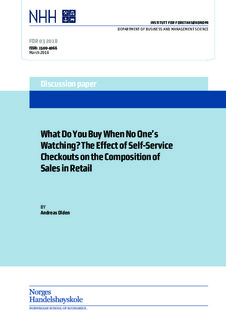| dc.description.abstract | Buying items that are unhealthy or are of a private nature may carry a stigma and cause embarrassment. I analyze whether the anonymity provided by self-service checkouts changes customers' shopping patterns in grocery stores. I look at a natural experiment where two stores in a grocery-chain implement self-service checkouts. Using a triple difference estimator, comparing the sales of stigma items to the sales of mundane items and to the sales of a group of control stores, I find that the sales of stigma items increase by 10-15 percent. The increase comes from the product categories candy, chips, soda, ready-made food and alcohol. I find that the increase is caused by existing customers buying more, rather than from self-service checkouts changing the customer base. However, fully converting to self-service seems to scare away some customers and decreases overall sales. | nb_NO |
